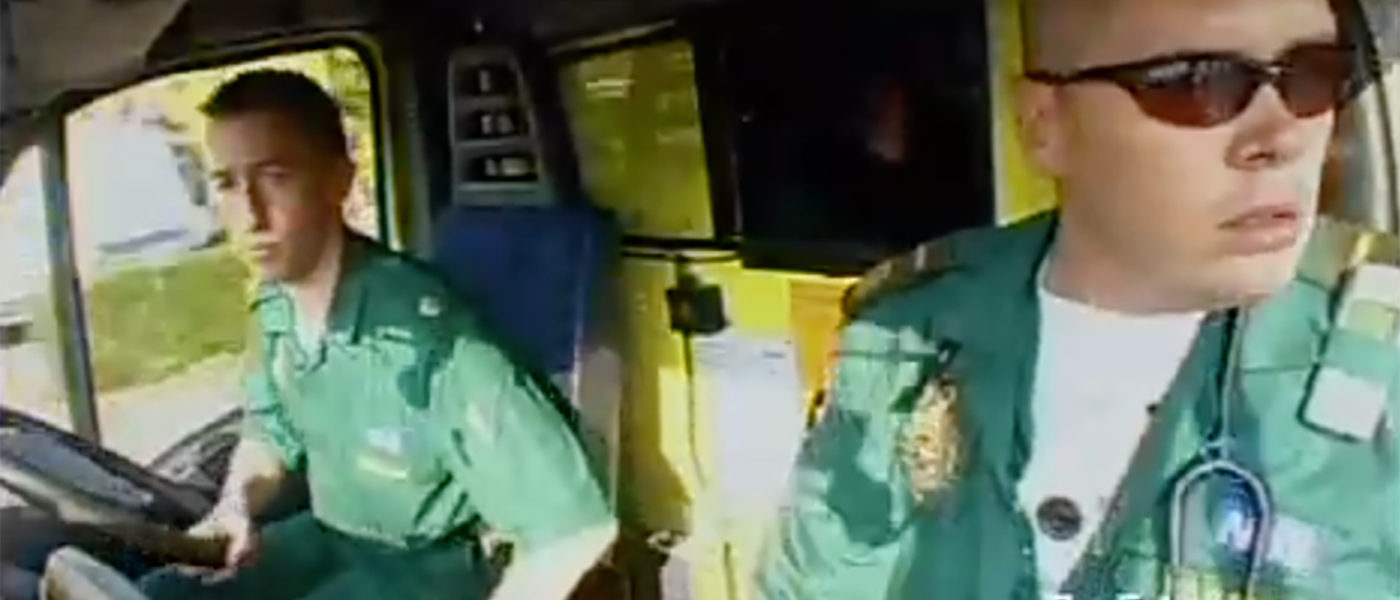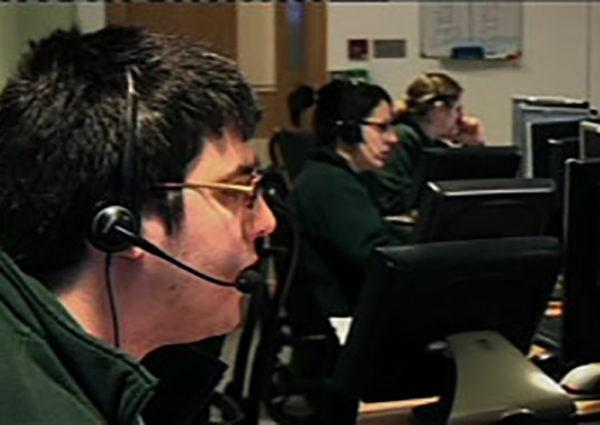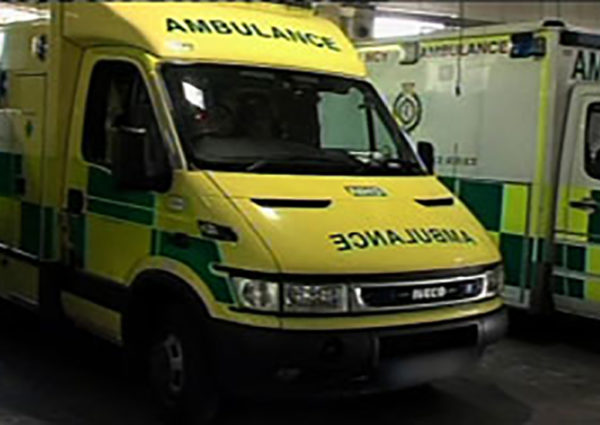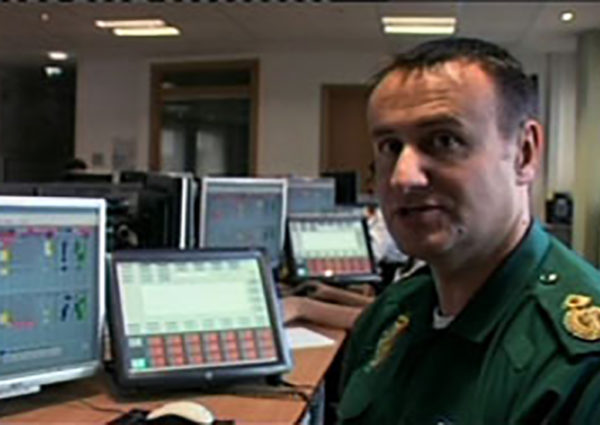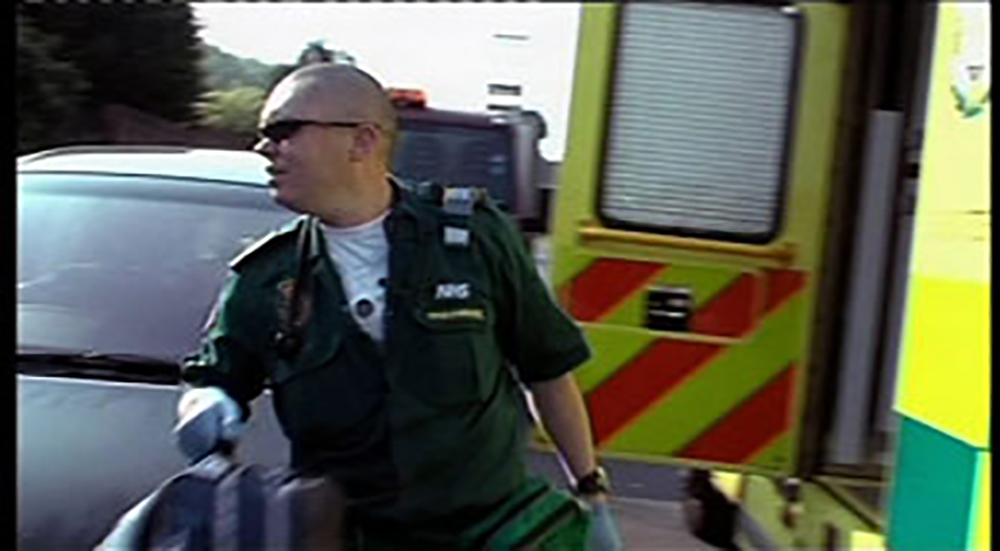Cutting Edge: The Ambulance
Channel 4
“A compelling and at times depressing view of modern Britain, and those
working on the front line of the NHS . . It’s a million miles from your run-of-the-mill ambulance-chasing show.” – Daily Mail
Reviews
An illuminating film following a month in the life of ambulance 212 in Reading, as the crew strive to meet government targets demanding that they reach major incidents within eight minutes. Coping with everything from drunken teenagers to suicide attempts, life-threatening situations and domestic incidents – and even people who dial 999 for a chat and a cup of tea (not just once, but regularly) with those nice boys and girls in green – the crews never know what to expect when they respond to a shout. Making life-or-death decisions under serious pressure is part of their working day. Cameras attached to the ambulance and the paramedics themselves provide a compelling and at times depressing view of modern Britain, and those working on the front line of the NHS – who all deserve a medal. It’s a million miles from your run-of-the-mill ambulance-chasing show.
For most of us it takes more than 8 minutes to stop hitting snooze and get out of bed in the morning. But for ambulance crews such as Reading’s 212 team that is how long, in order to comply with government targets, the crew has to reach 75 per cent of life threatening calls.
This Cutting Edge documentary charts a month in the life of ambulance 212 and its team, stopping off with them at everything from a breathtaking dash to get a five-year-old-hit-and-run victim to hospital before he stops breathing to infuriating visits to repeat callers who are often seeking little more than attention. The programme captures the minutiae of what is, as you would imagine, an incredible but grueling and often frustrating job.
‘I’d like a nice fractured leg or something simple,’ laments Rocky, one of the 212 crew, as he waits the start of his shift. But instead the first person he gets has slit his own throat and is bleeding to death. Later we learn that only 30 per cent of jobs the crew are called out for are actually emergencies. ‘The rest are just social work,’ laments another crew member, Iain.
While the programme offers what is no doubt a fascinating insight into what it’s like on the front line for one of the country’s emergency services, for me watching Eight Minutes to Disaster was a depressing experience I wouldn’t choose to repeat. If you’ve ever had the misfortune to spend an evening waiting in A&E, this is an hour long reminder of all the injuries and people you would rather forget from that experience. I have nothing but admiration for what crews like the team of ambulance 212 do, but I’d rather be curled up with a nice book than spend another evening seeing life – and death – through their eyes again.
Following the 212 ambulance over a month in Reading, this is a bleak, sometimes comic look at British life from the vantage point from a paramedic’s eight-minute callout. Over the following weeks the team pick up bloodied men after drunken Saturday night fights, come into a domestic dispute between a crack-ravaged couple and deal with a man who keeps taking overdoses. It’s fascinating, if sobering; no more so than when the team picks up a five-year-old boy run down by a car and on the point of death.
The Ambulance began with a weird tableau; a paramedic holding his own private rave in the back of an ambulance, hips whirling, hands waving over his head. After a few seconds, when the strangeness wore off, I realized he’d found the perfect venue, with flashing lights and pharmaceutical supplies en suite. Sorted.
The subtitle for this Cutting Edge film, ‘Eight Minutes to Disaster’, was poorly chosen, compounded from two tangentially related truths. The first is that ambulances have been set a target by the Government of reaching the scene of an emergency within eight minutes (that’s eight minutes from a 999 call being made, not eight minutes from the information reaching the ambulance crew). The second is that, for all the ambulance crew knows, any call could end in a disaster of some sort. But over the month that cameras accompanied ambulance 212 on its rounds in Reading, disaster turned out to be gratifyingly elusive. Fictions such as casualty and ER place ambulances at the centre of continual drama, but the prevailing mood of this bitty but largely excellent film was one of slow-moving, mildly cynical comedy, and those occasions when drama did threaten mostly spiraled down into banality. Which is how things are supposed to work, and a tribute to the intelligence, skill and compassion of 212’s crew: Paul, Iain, Stella and Vicky.
The tensest sequence in the entire film had 212 rushing to the aid of an elderly man who had collapsed and unable to locate the address – the next house to No 51 turned out to be 51A, and No 53 was nowhere in sight. After several minutes of driving round a labyrinthine housing estate, becoming more and more frustrated and anxious, they arrived at the house to find that, first, a fast response car had beaten them to it – at least the target time had been met – and second, that the elderly man had been dead for hours, his corpse already cold. I didn’t know whether to laugh or cry.
There were other moments when events were more straightforwardly dramatic: near the beginning, when Paul, the solitary raver, struggled to put a tube in the veins of an attempted suicide as the ambulance jolted through the streets at high speed (the man had cut himself too many times and anything Paul pumped in was likely to get pumped right out again); and right at the end, when they rushed a five-year-old boy, hit by a car, to A&E (a voice-over postscript reassured us that a week later he was home). But most of an ambulance crew’s duties are routine and tedious: taking little old ladies for medical appointments (often to the distress of the little old ladies, desperate not to be a bother), dusting down the local drunks when they fall over, and, far more depressingly, sorting out Saturday-night bingers when they get ill or violent. The cameras listened in on the control room as the calls came in. “What’s she doing now? She’s dribbling? How much has she had to drink?” “Well, I don’t have friends who punch me in the face.” This is, the crew testified, the worst thing they have to deal with: a culture that has lost any sense of limits – on how much you drink, how hard you hit people, who you’re allowed to hit (even when lives are at risk, emergency services have to take their chances).
This grisly, sometimes poignant documentary charting the month in the life of a Reading ambulance crew may surprise anyone who thinks that all paramedics are saintly. Through and onboard camera, we see one pair chuckling as they recall the patient who ripped “his testicular area”. Another, Rocky, reveals the sort of simple call-out he dreams about: “a nice fractured leg . . . or something.” But as we watch him mop blood off the ambulance’s steps after saving the life of a man who slit his own throat, we can feel only sympathy for him.
The ever-reliable Cutting Edge strand spends a month with an ambulance crew in Reading as they respond to emergency calls. All life at its most extreme is here. One day the crew delivers a baby; the next they rush to save a man who has stopped breathing. Their working lives are blighted by so-called rubbish calls – by people who would benefit more from social services than emergency medical care, or who treat them as a taxi service. They aim to get to an emergency with eight minutes, which includes 30 seconds to process the call and another 30 seconds to get on the road. They struggle hard not to become callous and harder still not to despise the culture of alcohol. Here is yet another reason to be profoundly grateful to the NHS.
The Ambulance: 8 Minutes to Disaster (Channel 4) sounds like a title that was written before the documentary was made. The ambulance crew would scream to their destination within the time allowed, to find old ladies who, judging by their incoherence, had mislaid their teeth, or the same drunk lying in the same gutter as yesterday (“Oh, it’s fucking Chewy again!”).
The pace was glacial. Perhaps one call in five is an emergency. The majority are, as they said, “social work sort of stuff.” A fat man who can’t get back into bed. A boy who ran over a badger. A half-hearted overdose. “I’m surprised she’s still alive. She tried to kill herself last week. She hasn’t even got Sky so we can watch the football.” Ineffectual people slashing about in a great puddle of tears and booze, like something out of Alice in Wonderland.
Told a man has stopped breathing, they race desperately from one wrong address to another, only to find he stopped breathing the previous day – as a pair of waxen feet indicated. Government targets stress speed not need, and the crews feel frustrated and wasted. “We breed a generation of people that take, take, take. Don’t take responsibility for their own lives. Won’t look after their own affairs. Little old ladies will sit at home for hours because they don’t want to bother us. Anyone from a different generation, all they’ve got to do is sneeze and they’re calling an ambulance. We’re not a taxi service.”
All their patients recovered except Chris, a homeless epileptic who didn’t take his medication, and, of course, the owner of the waxen feet.

